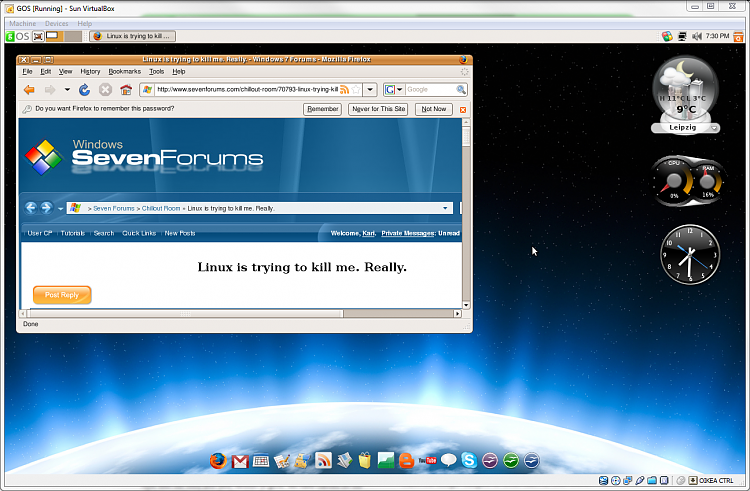New
#31
Pity... I have had nothing but joy with Linux.For the past half a year, I've been infrequently been trying to install multiple "flavors" of Linux.
First try was on my XP system. Tried installing Ubuntu, had an ISO straight from the site and settings were perfect for my system. Burned it to a CD at optimal settings, slowest speed possible. Booted from the CD, tried it out with the Live CD or whatever it's called, and loved it. I wanted it on my hard drive, right then and there, until I tried some of the included programs and found they were all missing... Got rid of the disc, didn't try again.
Second Try, about a month later, I got Fedora. Burned to disc and used a USB creator (so if the CD was messing it up, I had a USB to try as well). Tried installing, Partition Manager decided to go commando on my XP partition. Wiped the hard drive, put XP back on, then upgraded to 7 shortly after. It took me approx. 5 days to get everything back in working order, and it didn't help that I was missing drivers that I couldn't find online. Had to do a hunt all over the place to get them back. So by this time, my not-so computer inclined self was very tired of Ubuntu.
Third Try, about 5 hours ago, I heard about Wubi. Tried it, seemed awesome. Installed the Ubuntu Netbook Remix. Installed perfectly, no troubles at all. Partition Manager actually worked on this one! Woo! Then it rebooted. For 10 minutes, the boot screen did nothing but show error messages that I could not understand at all. Finally, it pulled up the login screen, I logged in, and started doing the basic setup. Change the clock, set up weather, get my apps running, etc, etc. It told me that my hard drive is failing (odd, as my hard drive was running Ubuntu and is now running 7). I tried getting some help, it told me that the help files are unavailable. It didn't let me do anything else. So I tried rebooting, and it loaded to the boot screen, did the same 10 minute routine, showed the login screen, and then promptly went away before I could do anything, and gave me a recovery console.
Tried installing the Desktop version, same thing.
Linux hates me. At least it didn't delete Windows this time. I know some of this is probably user error, but still. Come on. An automated installer should do the trick.
(is about to try again)


 Quote
Quote


 ). It's a joy...
). It's a joy...